Welcome to Matrix Education
To ensure we are showing you the most relevant content, please select your location below.
Select a year to see courses
Learn online or on-campus during the term or school holidays
Learn online or on-campus during the term or school holidays
Learn online or on-campus during the term or school holidays
Learn online or on-campus during the term or school holidays
Learn online or on-campus during the term or school holidays
Learn online or on-campus during the term or school holidays
Learn online or on-campus during the term or school holidays
Get HSC Trial exam ready in just a week
Get HSC exam ready in just a week
Select a year to see available courses
Science guides to help you get ahead
Science guides to help you get ahead
Save yourself the pre-exam stress and prepare like an ace student with these tips!

Join 75,893 students who already have a head start.
"*" indicates required fields
You might also like

Join 8000+ students each term who already have a head start on their school academic journey.
Do you find yourself scrambling through your notes and frantically attempting to cram information before your exams? Well, in this article, Matrix Scholarship student, Jennifer Dang, shares the secrets to acing Year 11 exams.
Jennifer Dang
Fort Street High School
Year 11, 2020
99.55
Medicine at the Australian National University/ UNSW
Hello, I’m Jennifer Dang and I am currently a senior at Fort Street High School.
I am loving my studies there and I am very passionate about learning new things and challenging myself. So, I decided to take on Extension 2 English and Maths for my HSC course alongside Biology and Chemistry as well.
I have always been a Science student because I am constantly curious about the world and trying to understand it.
But when my head is not in the books, I’m outside playing volleyball, reading a good book or baking macarons for my friends and family, I’m always excited to try out new recipes as well.
My long-term goal is to become a radiologist as I’m very interested in the human body and I think having the skillset to diagnose a disease is truly very valuable. I know it will be quite a long journey, but I’m determined to push myself until I accomplish my dreams.
At school, I’m part of the volleyball club, Charity Committee, Amnesty Committee, Environmental Committee and the Student Representative Council.
The volleyball club is a very fun extracurricular activity that has allowed me to build skillsets in team cohesion.
The Charity Committee allows me to fundraise and raise awareness for concerns which I also highly value as well. The Amnesty committee has allowed me to gain better insight into the world and figure out solutions to fight for equality for all.
Moreover, I greatly value a sustainable lifestyle in order to protect our Earth and through the environmental committee we have come up with plans for a more sustainable school.
At my school, Year 11s are the prefect leaders instead of the Year 12s. So, I am the prefect of public relations and I have loved connecting with the student body and leading the school through this great opportunity.
Outside of school, I volunteer to teach Vietnamese at my local language school to give back to the community. I help children of ages about 7-12 learn the basics of the Vietnamese language and introduce them to cultural practices and values as well. I think it is very rewarding to see how passionate the young children are at learning and I love passing on my knowledge onto others.
I personally have always tried to push myself beyond boundaries and I like challenges.
Hence, that is why I am taking on Extension 2 English, Extension 2 Mathematics, Chemistry and Biology for my HSC. Since I am undertaking an extra 2 units I have realised that in order to perform the best at all my subjects I would need to drop a subject.
It was honestly a very hard decision for me between the three Sciences.
Although I enjoyed the Physics preliminary course immensely, I found that I was more interested in Chemistry and Biology. They related more to what I wanted to study at university.
English
I really enjoy English because of the types of assessments we get tested on. Analysis of texts is very formulaic, and I believe everyone can write a really good essay.
However, creative writing is very subjective, but I like how you can express your values and concerns through writing and the boundaries are endless.
I believe I am good at English because I always try to delve more in-depth in the texts we study beyond class discussions to stand out among my class.
Moreover, for creative writing, I think the purpose of a text is key and articulating this alongside the inclusion of authentic and innovative literary techniques really allows a story to shine.
Mathematics
Mathematics is my favourite subject because it is very mind stimulating and requires logical approaches. Although it can be frustrating at times, I love the feeling of being able to solve a hard question.
The real-world applications of maths help me understand the mechanisms of the world and I think maths is necessary for any occupational field and for life.
I think I am good at maths because I try to understand the theory of the concepts before attempting questions rather than memorising methods. This way I can apply the knowledge to any problem.
Biology
I’m very interested in the human body and biology has introduced me to the basic understanding of how the human body works.
The preliminary course has changed my understanding of life and I am very eager to complete the HSC course, especially the modules about diseases.
I dream of a career in Medicine and so Biology has fuelled my passion for Medicine further as the content is highly interesting and mesmerising.
Our HSC experts will help you break down concepts and understand them through structured theory video lessons. Our comprehensive resources will provide you with a plentiful bank of practice questions. And, our Q&A boards will answer all of your individual needs and questions.
Don't just memorise. Understand.
Expert teachers, weekly quizzes, one-to-one help! Ace your next Biology assessment with Matrix+ Online.
Mathematics
Although I believe I am doing quite well in Maths, I’m constantly held back by silly mistakes in exams.
So, I decided to do most of my preparation under time pressure so I can get used to the tense atmosphere and checking my work on the way to avoid silly mistakes.
If the question is too wordy, I would underline key parts and slowly work my way to the solution.
I have a book for all the difficult questions I have encountered, and I redo these questions when exams are near to work on my weak areas and ensure I can solve similar problems if they appear in the test.
I also have a book of mistakes that I regularly review to ensure that I do not make the same mistake twice.
I believe to get better at maths you have to expose yourself to as many exam-style questions possible and so doing as many past papers really helps.
Physics
Sometimes the concepts in Physics do not make any sense to me.
But I realised if I can see the problem through multiple different angles, I can slowly build a picture of the situation and slowly work my way through the problem.
To get better at it, I have asked more questions in class to fully understand the concepts better.
Watching videos on the different concepts also help me better understand and visualise the theory as well.
The first thing I do is take out my diary and start planning.
I first put down each day I have exams and a couple of days prior to that exam would be mainly focusing on studying that subject, no distractions from other subjects.
I also try to maximise my time as possible which would mean temporarily ceasing/minimising activities like volleyball, baking and reading.
I also like to reorganise my study space, ensuring there is only the things I need, my laptop, pens, paper and a calculator. This ensures that I stay focused.
I mainly use Matrix free trial papers which I have found immensely helpful and quite similar to my school’s exam questions as well.
I also recommend scavenging around the school library to find resources that are very helpful mostly from Excel and Cambridge Checkpoints which have sample yearly tests and many questions to test your knowledge.
I write my notes throughout the term as I am learning, this saves a lot of time as when exam period begins, I read over my notes and start attempting past papers straight away.
However, if I do not fully understand a concept, I will create simple flowcharts to reiterate key concepts. I also believe this routine allows me to better understand the subject as I would have not missed writing down any essential points discussed in class which are not in some textbooks.
I also recommend using loose-leaf paper and a binder because in this way if you miss out on a topic or want to add more, you can easily insert extra paper, unlike an exercise book.
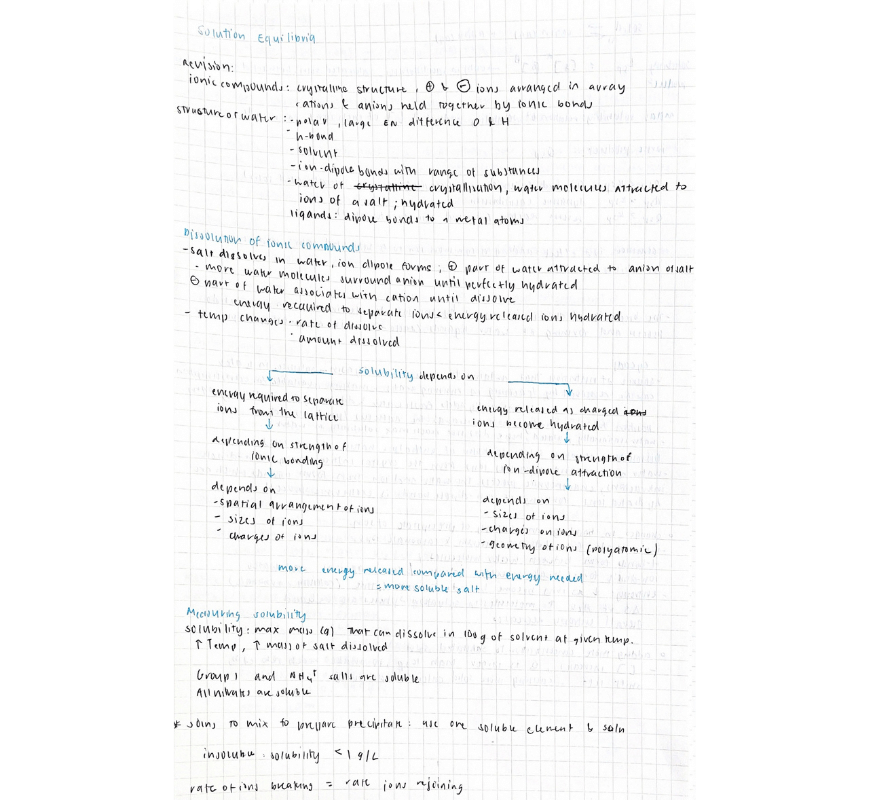
To practice, I attempt my school’s past paper on the subject at least three times.
This is because the first test is to figure out what I do and do not know in the syllabus and find out my areas of weakness to refresh my memory on what I need to study again.
The second time is to confirm my knowledge and I try to answer the questions in a much more in-depth way, with my newly attained knowledge.
The third try is honestly not needed as by now I would have probably remembered all the answers, but teachers tend to add one or two questions from previous year’s papers.
Besides school past papers, I try to find online resources from other schools and also Matrix resources.
For Biology, Chemistry, and Physics the Matrix sample yearlies were extremely helpful to me.
For Maths, the end of term topic tests are a great way to revise.
For English, I write a rough draft and practice essays by trying to answer multiple possible exam type questions on the topic and manipulate my draft essay to answer the question.
I also time myself and see how much I can write in approximately 40 minutes. This trains my hands to write faster and give me a guide on how long I should be writing for each paragraph.
1. Read critical and scholarly material
For essay writing, I spend lots of time reading critical and scholarly material on the texts.
This way, I can understand the stories further and also gain some ideas which extend beyond class discussions and make me stand out amongst class responses.
2. Compile notes through context, content, and themes
I compile my notes through two main headings of context and content as I believe the context of the author and when the story is written plays crucial roles in the establishment of the story.
For content, it is dot points of thematic concerns and key ideas. I then link these two headings together to understand how context has affected the content of the stories.
| Context | Content |
| Author | Thematic Concerns |
| Time Period | Useful/Important Quotes |
Image: English Notes
3. Write essays by starting with the body
I also always begin writing my essays by starting with the body paragraphs and the introduction last.
This way is most effective as I would have established my major points first and can summarise them in a more concise way in the introduction.
4. Find a purpose before writing a creative
For creative writing, I always start by identifying the purpose of my writing. I find this helps immensely especially when I also need to write a reflection statement.
Establishing my purpose also allows me to get into the mindset to begin writing. I try to impress the teachers by adding literary techniques like an extended metaphor or motifs that will add more depth to my work.
I make a mind map of possible recurring images that are suitable for my story and briefly explain how I will use it, then I select the best option.
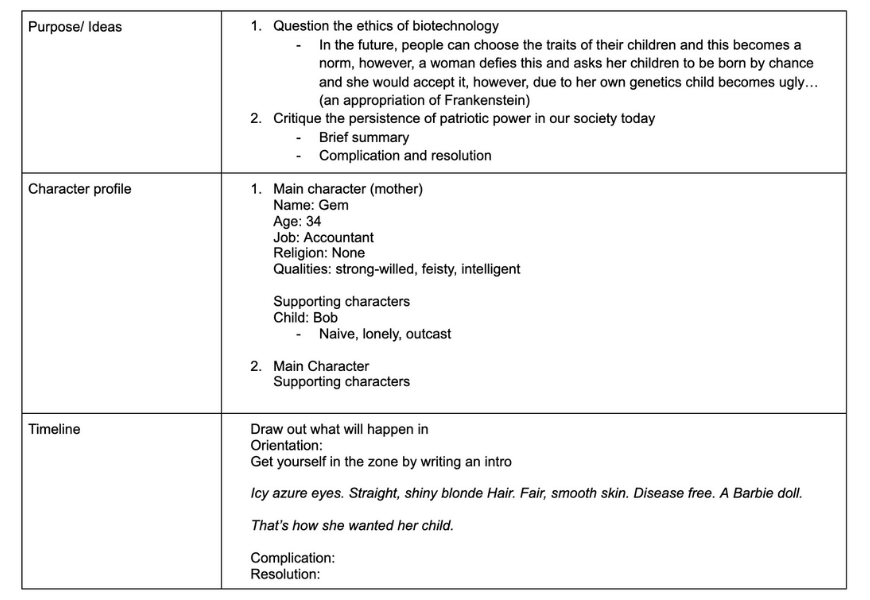
1. Maintain a book of mistakes
I think to perform the best at Maths is to not repeat the same mistake twice. That is why, I have a book of mistakes, a book of difficult questions and a book of formulas/key notes.
For my book of mistakes, I redo questions that I got wrong in my test papers before looking at the solutions.
I attempt these three times and if I still have no idea how to do the question, I look at the solutions and write it in my mistakes book.
I also make a simple list of silly mistakes that I encounter like “check Pi for t-formula” to read on test day to ensure that I do not make the same mistake twice.
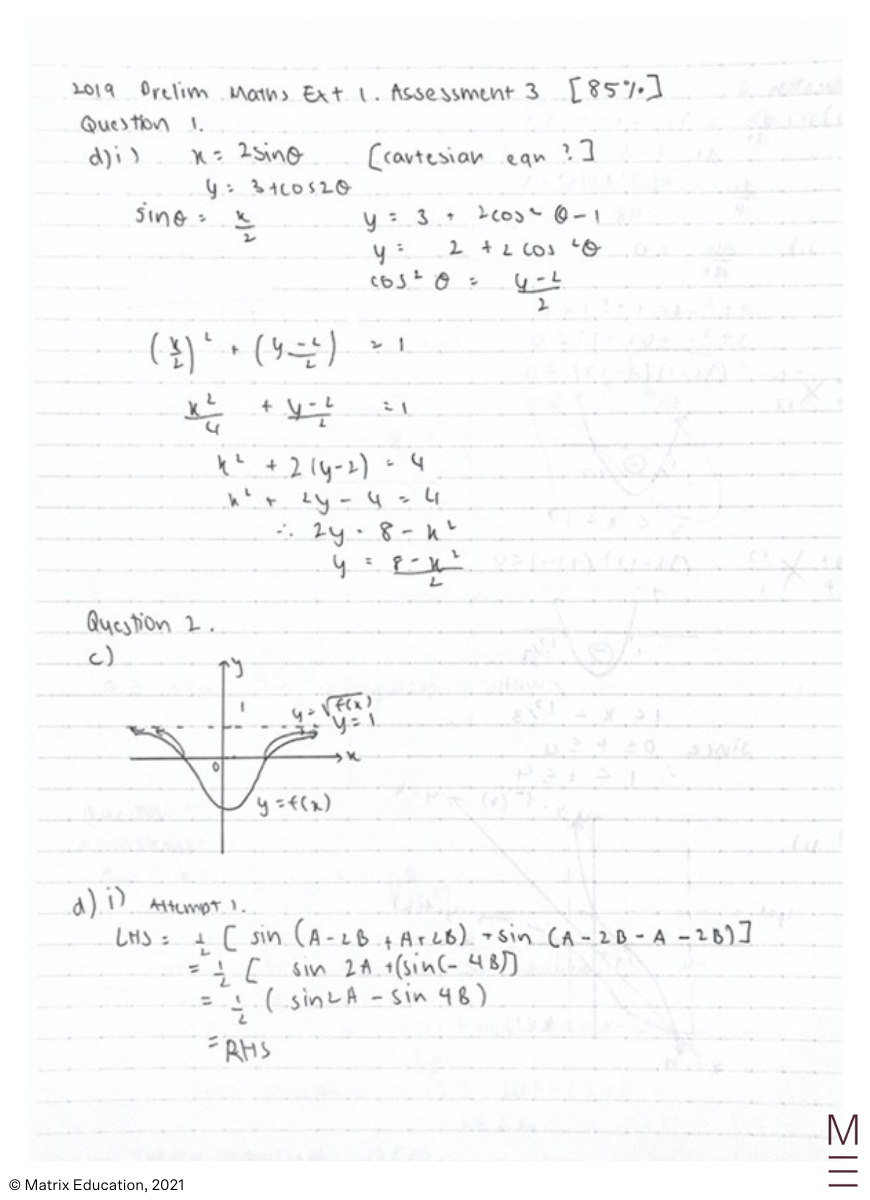
2. Maintain a difficult questions book
For my difficult questions book, I rewrite challenging questions and their solutions in a book. So, when exams are near, I can refer to these hard exam-style questions.
This helps me feel less nervous about the test.
I would cover the solution and try to do the question again.
If I cannot do it, then I would make a mental note to attempt similar questions in the Matrix theory/workbook or go through the Matrix theory book chapter again.
3. Maintain a book of formulas
I believe a book for formulas is very crucial for any maths student, as although the formula sheet is helpful, it does not include all necessary materials through the years.
My formula book is quite small, so it is very handy, and I have separated it according to topics, so it is extremely useful for when I forget a formula on any topic.
I believe you cannot write notes for maths as tests are always applications questions and so to excel you have to expose yourself to a numerous range of exam-style questions and constantly find questions to attempt.
My notes are all written according to the different modules from NESA under all the inquiry questions and dot points as well.
For Chemistry, you have to understand the concepts a lot and I do this by constantly attempting practice questions.
I’m also a very visual learner and so my notes contain lots of colour and different sticky notes to emphasise key concepts and I believe in this way I can retain more information.
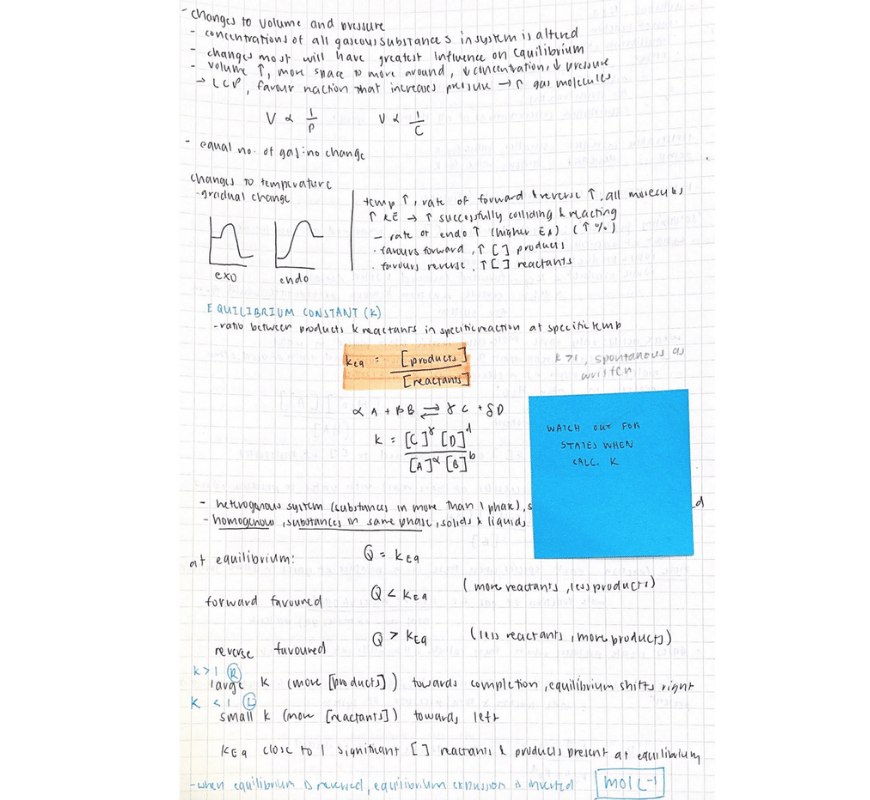
I think most people can agree that Biology is a very information-loaded topic which needs a lot of memorising.
I separate my notes based on modules and try to answer the key inquiry questions and dot points of the syllabus, making sure I cover all examinable content.
At the end of my notes, I have a list of common test questions for example “Practices to restore mining” where I would write a sample response.
Then, after writing the paragraph I would find keywords to make an acronym out of so I could easily remember the structure of the response.
I utilise acronyms heavily in Biology to remember concepts.
Even if they do not make sense, I say it in a funny tone or rearrange the letters to make a word. This is very effective to remember something.
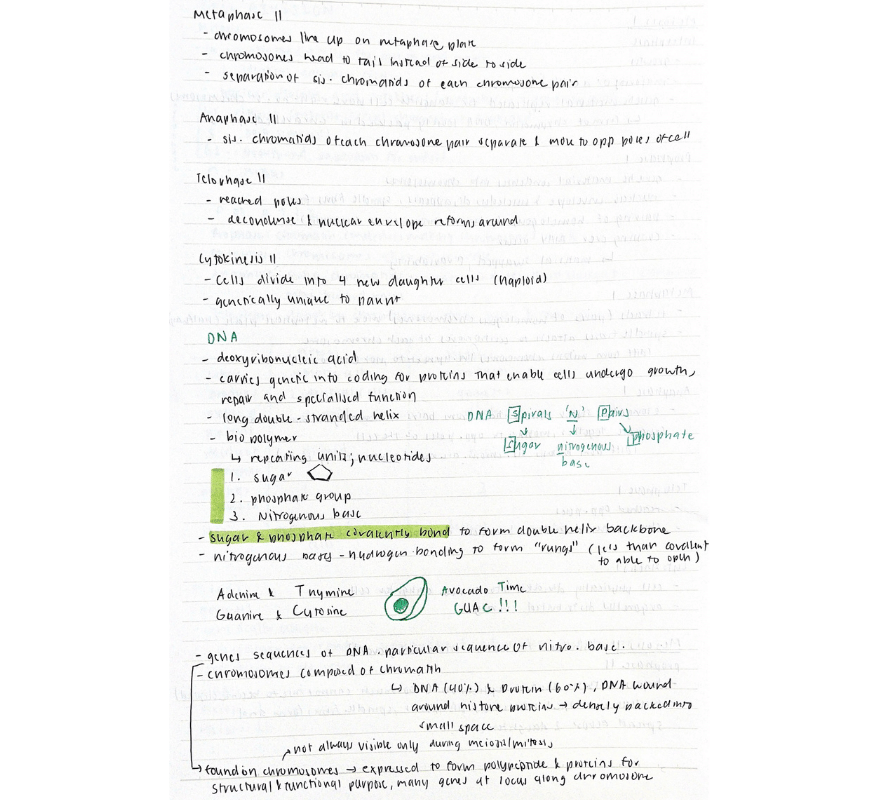
I write most of the notes during the school and I use the time through the term to revisit difficult concepts to understand/memorise.
Moreover, I believe reviewing my notes is very important in order to remember material. So, I would spend some time every half term to read over my notes and if I need clarification, I would ask my teacher or read the textbook again.
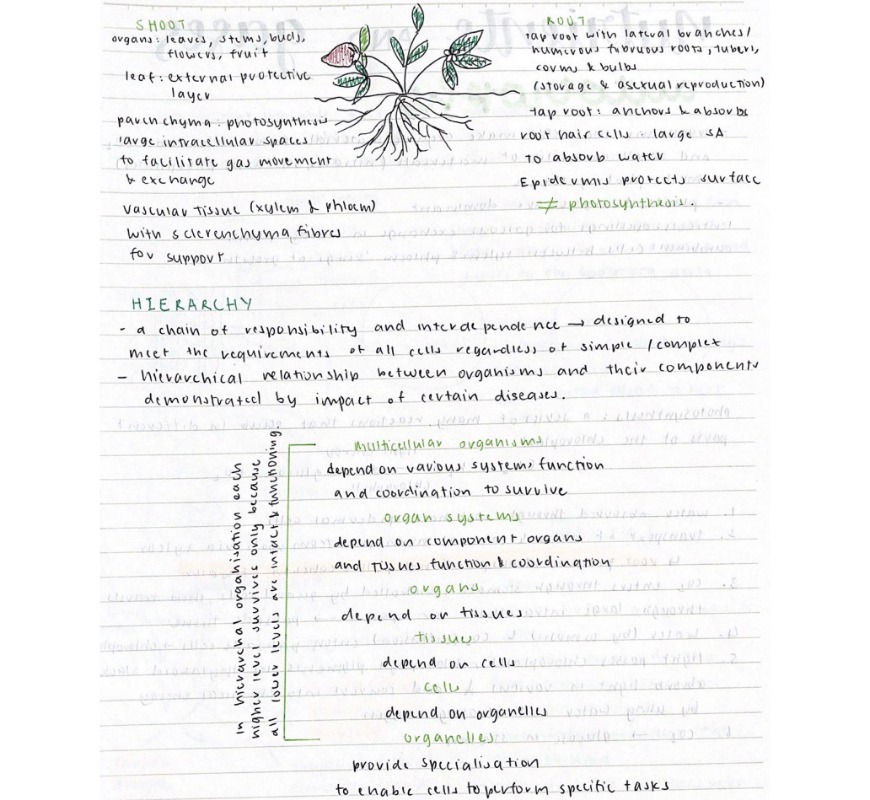
At our school we don’t have prefect leaders, instead, the Year 11 Student representatives are the leaders of the school and have roles like prefects at other schools.
I was initially a very shy student, but I tried out to be a prefect for my school and through the support of my peers and my teachers I got elected to be the prefect for public relations.
This really allowed me to connect more with the student body, enhance my skills in leadership and engage in more public speaking scenarios so that I would gain confidence in front of an audience.
At the start of high school, I struggled immensely with maths but over the years I have put in the effort to understand the subject better and practice time management and exam skills that will ensure me to maximise my marks.
This year I have completed my HSC trial for Maths Advanced and Extension 1. I’m currently studying for my accelerated HSC and I’m very proud that I have made a top 10 rank.
This surely proves that time, dedication and hard work really pays off.
I regret not utilising my teachers more during the course of the year.
Teachers have an abundance of knowledge and I really regret not always double checking my work or getting feedback from my teachers.
I have learned that teachers are there to support us and that teachers also like it when students ask them for help because it makes the class much more engaging.
So if I was to turn back time, I would utilise my teachers more, at school and at Matrix because they are always willing to help and in this way, I can gain some more clarification on a concept and score better grades.
Think you’ve got what it takes to be a Matrix scholarship student? Learn more about our scholarship program and the application process, here.
Written by Guest Author
We have regular contributions to our blog from our Tutor Team and high performing Matrix Students. Come back regularly for these guest posts to learn their study hacks and insights!© Matrix Education and www.matrix.edu.au, 2025. Unauthorised use and/or duplication of this material without express and written permission from this site’s author and/or owner is strictly prohibited. Excerpts and links may be used, provided that full and clear credit is given to Matrix Education and www.matrix.edu.au with appropriate and specific direction to the original content.